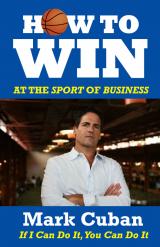In my opinion, I think too many people today are hung up on their definition for success, rather than simply feeling or accepting success on their own terms.
Think about it: the media is constantly bombarding us with stories of what they deem to be success: money, high-powered careers, cars, clothes. I think there is a big misconception between fame and success because I personally know a lot of people that are successful that are not famous, and I am sure we can all name a few famous people that are not successful. So let me share an obvious revelation with all of you: you don’t need to hit home runs to be successful. Base hits are just as valuable for the win.
 I recently had the pleasure of reading Mark Cuban’s book, How To Win At The Sport of Business and I was happy to see that I am not alone when it comes to practical definitions for success. According to Mark, “One’s efforts should really be measured by their ability to set goals and achieve results, not simply by the amount of hours one works in a single day.” I completely agree. Choosing to be a workaholic and, even worse, wasting precious time that you can never get back without even achieving results is ludicrous.
I recently had the pleasure of reading Mark Cuban’s book, How To Win At The Sport of Business and I was happy to see that I am not alone when it comes to practical definitions for success. According to Mark, “One’s efforts should really be measured by their ability to set goals and achieve results, not simply by the amount of hours one works in a single day.” I completely agree. Choosing to be a workaholic and, even worse, wasting precious time that you can never get back without even achieving results is ludicrous.
“People who are exceptionally good in business aren’t so because of what they know but because of their insatiable need to know more.” – Michael E. Gerber (author of The E-Myth Revisited)
Successful people like Mark Cuban and Michael Gerber may make success look easy, but I can assure you, both gentlemen are constantly reading and searching for new ways to expand their knowledge in order to do things better and “smoke” their competition in a way that properly utilizes their precious time.
In his book, Mark talks about how one goes about winning a segment of his or her business and finding one’s edge. He not only writes of where one’s edge comes from, but the steps it takes to get there.
The important takeaways for me from Mark’s book are:
- study your business
- understand what it will take to differentiate yourself from your competition when dealing with clients
- and, most importantly, your willingness to do what it takes to get results
To continue to replicate your success, you need to understand “why” you are succeeding in the first place and then continue to build on that success.
“If you aren’t happy with where you are, simplify your life and go out and try as many things as it takes to find what you may be destined to be.” – Mark Cuban
My personal philosophy for success is simple: “Do what you love every day of your life while surrounding yourself with positive people that love and support you.”
Successful people get to choose the life they want to live by surrounding themselves with positive people that love and support them, while at the same time getting up every morning to pursue a passion they love.
Hey, that sounds like a pretty cool definition to me.

 Did you ever have that feeling of disappointment when you really set your mind to doing or achieving something and it did not turn out quite the way you planned? You sat down and drew out all the action steps necessary to achieve your desired goals; you studied or learned a new skill; you spoke to others you believed were the right people that could help you get what you had been looking forward to for months and then wham; nothing.
Did you ever have that feeling of disappointment when you really set your mind to doing or achieving something and it did not turn out quite the way you planned? You sat down and drew out all the action steps necessary to achieve your desired goals; you studied or learned a new skill; you spoke to others you believed were the right people that could help you get what you had been looking forward to for months and then wham; nothing.